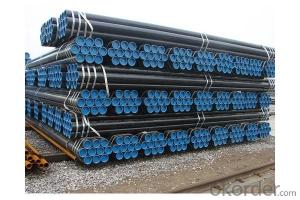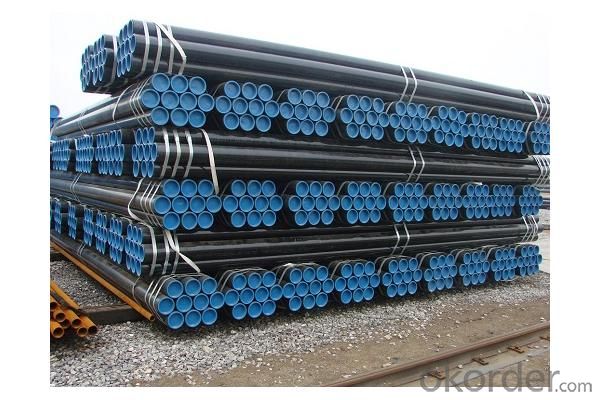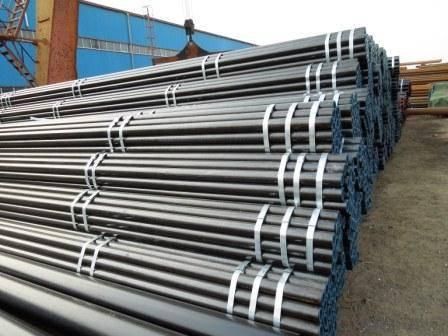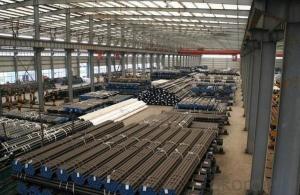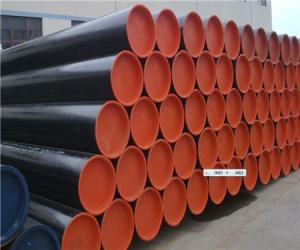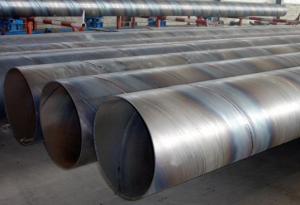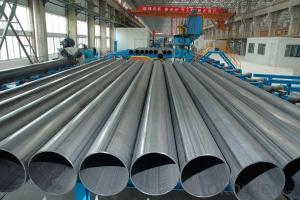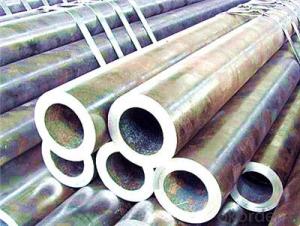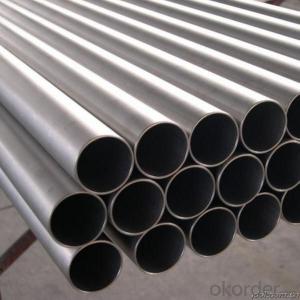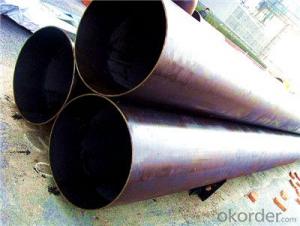ERW Steel pipe production serious of top quality
- Loading Port:
- Tianjin
- Payment Terms:
- TT OR LC
- Min Order Qty:
- 25 m.t.
- Supply Capability:
- 8000 m.t./month
OKorder Service Pledge
OKorder Financial Service
You Might Also Like
1、Structure of Welded Black ERW Steel Pipe:
ERW steel pipe is electric resistance welding, the abbreviation for ERW for transporting oil and natural gas vapor liquid objects, can meet the requirements of high and low pressure, the transport in the world with pipe sector accounted for a pivotal position.
2、Main Features of Welded Black ERW Steel Pipe:
• High manufacturing accuracy
• Advantage of high strength
• Good visual effect
• Reasonable price advance
• Small inertia resistance advance
• Strong heat dissipation ability
3、Welded Black ERW Steel Pipe Specification:
Standard | GB, DIN, ASTM ASTM A106-2006, ASTM A53-2007 |
Grade | 10#-45#, 16Mn 10#, 20#, 45#, 16Mn |
Thickness | 1 - 33 mm |
Section Shape | Round |
Outer Diameter | 21 - 610mm |
Place of Origin | Tianjin, China (Mainland) |
Secondary Or Not | Non-secondary |
Application | Hydraulic Pipe |
Technique | Cold Drawn |
Certification | API |
Surface Treatment | factory state or painted black |
Special Pipe | API Pipe |
Alloy Or Not | Non-alloy |
Length | 5-12M |
Outer Diameter | 21.3-610mm |
Grade | 20#, 45#, Q345, API J55, API K55, API L80, API N80, API P110, A53B |
Standard | ASME, ASTM |
1) Material:20#(ASTM A 106/A53 GRB.API5LGRB,GB),45#,16Mn,10#.
2) Specification range:OD:21.3-610mm,WT:6-70mm,length:6-12m or according to the requirement of clients.
3) Excutive standards:GB,ASME API5L.ASTM A 106/A53,Despite of the above standards,we can also supply seamless steel pipe with standard of DIN,JIS,and so on,and also develop new products according to the requirements of our clients!
4) Surface:black lacquered,varnish coating or galvanized.
5) Ends:Beveled or square cut,plastic capped,painted.
6) Packing:bundles wrapped with strong steel strip,seaworthy packing.
4、Packaging & Delivery
Packaging Details: | seaworthy package,bundles wrapped with strong steel strip |
Delivery Detail: | 15-30days after received 30%T/T |
5、FAQ of Welded Black ERW Steel Pipe:
①How is the quality of your products?
Our products are manufactured strictly according to national and internaional standard, and we take a test
on every pipe before delivered out. If you want see our quality certifications and all kinds of testing report, please just ask us for it.
Guaranteed: If products’ quality don’t accord to discription as we give or the promise before you place order, we promise 100% refund.
②How about price?
Yes, we are factory and be able to give you lowest price below market one, and we have a policy that “ for saving time and absolutely honest business attitude, just don’t waste your time.Please trust the quotation we would give you, it is professional one.Sure that we will provide you satisfy price for you and the most important is what we provide you is not only in price advantage and also in advantage of quality.
③Why should you chose us?
Chose happens because of quality, then price, We can give you both.Additionally, we can also offer professional products inquiry, products knowledge train(for agents), smooth goods delivery, exellent customer solution proposals.Our service formula: good quality+good price+good service=customer’s trust
SGS test is available, customer inspection before shipping is welcome, third party inspection is no problem.
6、 Welded Black ERW Steel Pipe Images:
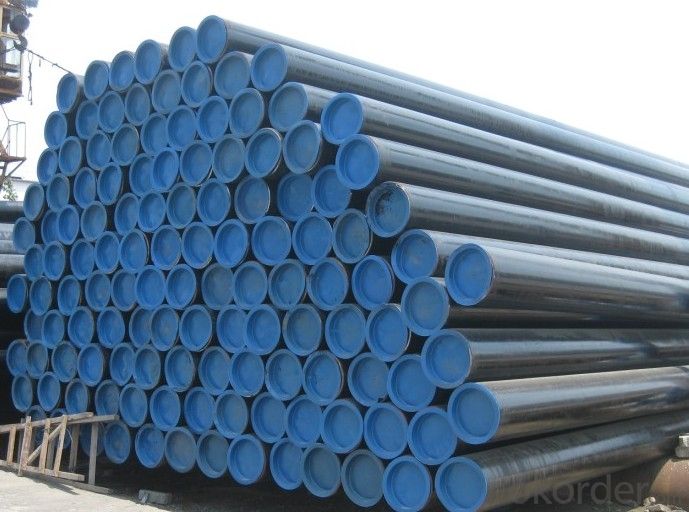
- Q: What are the factors that affect the price of steel pipes?
- Some factors that can affect the price of steel pipes include the cost of raw materials, such as iron ore and other metals used in the production of steel, fluctuations in global steel demand and supply, transportation costs, market competition, and government regulations and tariffs. Other factors can include energy costs, labor costs, and the overall economic conditions of the countries involved in the steel industry.
- Q: How are steel pipes used in the construction of shipbuilding?
- Steel pipes are commonly used in shipbuilding for various purposes such as transporting fluids, supporting structures, and providing stability. They are used for the construction of the ship's hull, bulkheads, and compartments, as well as for the installation of water, fuel, and ventilation systems. Steel pipes are also utilized for the construction of masts, rigging, and other ship components that require strength and durability.
- Q: What are the different types of steel pipes available?
- There are several types of steel pipes available, including seamless pipes, welded pipes, galvanized pipes, and stainless steel pipes.
- Q: What are the different methods of protecting steel pipes from external damage?
- There are several methods of protecting steel pipes from external damage, including coating the pipes with a corrosion-resistant material such as epoxy or polyethylene, applying a layer of protective tape, installing a cathodic protection system, using concrete or rock shielding, and implementing measures to prevent soil movement or impact damage.
- Q: How are steel pipes used in the manufacturing of food processing machinery and equipment?
- Steel pipes are an essential component in the manufacturing of food processing machinery and equipment due to their numerous advantageous properties. These pipes are widely used in the food industry for their durability, corrosion resistance, and ability to withstand high temperatures and pressures. One of the primary applications of steel pipes in food processing machinery is for the transportation of various fluids and gases. These pipes are used to carry water, steam, and other liquids, as well as air and gases, throughout the processing plant. Steel pipes provide a reliable and hygienic means of transferring these substances, ensuring that the quality and safety of the food products are maintained. Moreover, steel pipes are also utilized in the design and construction of food processing equipment such as mixers, blenders, conveyors, and canning machines. These machines often require the use of pipes to facilitate the movement of ingredients, processing fluids, and cleaning agents. Steel pipes are an ideal choice for these applications due to their high strength, which allows them to handle the heavy loads and pressures associated with food processing operations. Another crucial aspect of steel pipes in food processing machinery is their resistance to corrosion. Food processing involves the use of various acidic and alkaline substances, as well as hot water and steam, which can cause corrosion in other materials. Steel pipes, particularly those made from stainless steel, are highly resistant to corrosion, ensuring that the machinery remains in optimal condition and prolonging its lifespan. Furthermore, the smooth internal surface of steel pipes allows for efficient and hygienic cleaning, as it minimizes the accumulation of food particles and contaminants. This is of utmost importance in the food industry, where maintaining high levels of cleanliness is essential to prevent the growth of bacteria and ensure food safety. In summary, steel pipes play a crucial role in the manufacturing of food processing machinery and equipment. Their durability, corrosion resistance, ability to handle high temperatures and pressures, and hygienic characteristics make them an ideal choice for the transportation of fluids and gases, as well as for the construction of various food processing equipment.
- Q: How are steel pipes used in stadium construction?
- Steel pipes are commonly used in stadium construction for various purposes such as structural support, plumbing systems, and the installation of lighting and audio equipment. They provide strength, durability, and versatility, making them ideal for ensuring the overall stability and functionality of the stadium.
- Q: Can steel pipes be used for underground fuel storage systems?
- Yes, steel pipes can be used for underground fuel storage systems. Steel pipes are commonly used in underground fuel storage systems due to their strength, durability, and resistance to corrosion. They provide a reliable and long-lasting solution for storing fuel underground, ensuring that it remains secure and protected. Steel pipes are also able to withstand the pressure and weight of the fuel, making them a suitable choice for underground storage. Additionally, steel pipes can be easily welded and interconnected, allowing for flexibility in designing and constructing underground fuel storage systems. However, it is important to ensure that the steel pipes used for underground fuel storage systems are properly coated or lined to prevent corrosion and protect the fuel from contamination. Regular inspections and maintenance are also necessary to identify and address any potential issues that may arise.
- Q: What are the different standards for steel pipe manufacturing?
- There are several different standards for steel pipe manufacturing, including the American Society for Testing and Materials (ASTM), International Organization for Standardization (ISO), and the American National Standards Institute (ANSI). These standards outline the specifications for various aspects of steel pipe production, such as dimensions, material composition, mechanical properties, and testing procedures to ensure quality and safety.
- Q: How do you measure the thickness of a steel pipe?
- To measure the thickness of a steel pipe, you can use various methods depending on the precision required and the tools available. Here are three common approaches: 1. Calipers or Vernier Calipers: Calipers are a simple and widely used tool for measuring thickness. Open the calipers and place the jaws on either side of the pipe, ensuring they are perpendicular to the surface. Close the jaws until they lightly touch the pipe, then read the measurement on the caliper scale. 2. Ultrasonic Thickness Gauge: This method offers more accurate results and is often used in industrial settings. An ultrasonic thickness gauge emits high-frequency sound waves that penetrate the steel pipe. By measuring the time it takes for the sound waves to bounce back, the gauge calculates the thickness of the pipe. Ensure the pipe surface is clean and smooth before taking the measurement. 3. Magnetic Thickness Gauge: This method is specifically designed for measuring the thickness of ferrous materials like steel. The gauge contains a small magnet that adheres to the pipe surface. By applying a magnetic field, the gauge measures the distance between the magnet and the base plate. This distance corresponds to the thickness of the steel pipe. It's important to note that each method has its own accuracy limitations, and the choice of measurement technique should be based on the desired precision, availability of tools, and the specific requirements of the application.
- Q: What are the safety precautions to follow when working with steel pipes?
- To guarantee the safety of yourself and those around you while working with steel pipes, it is crucial to adhere to a number of safety measures. These measures encompass the following: 1. Personal Protective Equipment (PPE): It is imperative to always wear the appropriate PPE when dealing with steel pipes. This includes safety glasses, gloves, steel-toed boots, and a hard hat. By utilizing PPE, you can shield yourself from potential hazards such as flying debris, falling objects, and sharp edges. 2. Proper Lifting Techniques: Given that steel pipes can be heavy and unwieldy, it is essential to employ proper lifting techniques to avoid strain or injury. Remember to bend your knees, maintain a straight back, and utilize your legs to lift the pipes. If a pipe is too heavy to lift on your own, seek assistance or employ mechanical lifting equipment. 3. Secure Working Area: Ensure that the work area is tidy, well-organized, and devoid of tripping hazards. Keep the floor clear of tools, debris, and other obstructions that may lead to accidents. Additionally, establish barricades or cordons to prevent unauthorized access and guarantee the safety of others. 4. Use Proper Tools and Equipment: Employ the correct tools and equipment for the task at hand. This entails utilizing wrenches, pipe cutters, and clamps specifically designed for steel pipes. The usage of inappropriate tools can result in accidents, damage to the pipes, or faulty connections. 5. Proper Storage: Store steel pipes in a secure and organized manner to prevent them from falling or rolling onto individuals. Stack the pipes in a stable position and employ racks or supports to ensure they are not at risk of toppling over. 6. Secure Connections: When connecting steel pipes, ensure that the connections are adequately secured. This entails utilizing suitable fittings, tight fasteners, and adhering to the recommended torque specifications. Loose or improperly secured connections can lead to leaks, bursts, or other failures. 7. Proper Ventilation: If working in an enclosed space, ensure there is sufficient ventilation to prevent the accumulation of harmful gases or fumes. Welding or cutting steel pipes can release hazardous gases, so it is vital to ensure proper ventilation or employ respiratory protection if necessary. 8. Fire Safety: During welding or cutting processes, steel pipes can become extremely hot. Make sure to have fire extinguishers readily available and familiarize yourself with their usage. Remove any flammable materials from the work area and exercise caution around sparks or open flames. 9. Regular Inspections: Routinely inspect steel pipes for any signs of damage, such as cracks, rust, or degradation. Replace any damaged or compromised pipes to avoid potential failures or accidents. By adhering to these safety precautions, you can mitigate the risks associated with working with steel pipes and maintain a safe working environment. Always remember that safety should be the utmost priority.
Send your message to us
ERW Steel pipe production serious of top quality
- Loading Port:
- Tianjin
- Payment Terms:
- TT OR LC
- Min Order Qty:
- 25 m.t.
- Supply Capability:
- 8000 m.t./month
OKorder Service Pledge
OKorder Financial Service
Similar products
Hot products
Hot Searches
Related keywords
